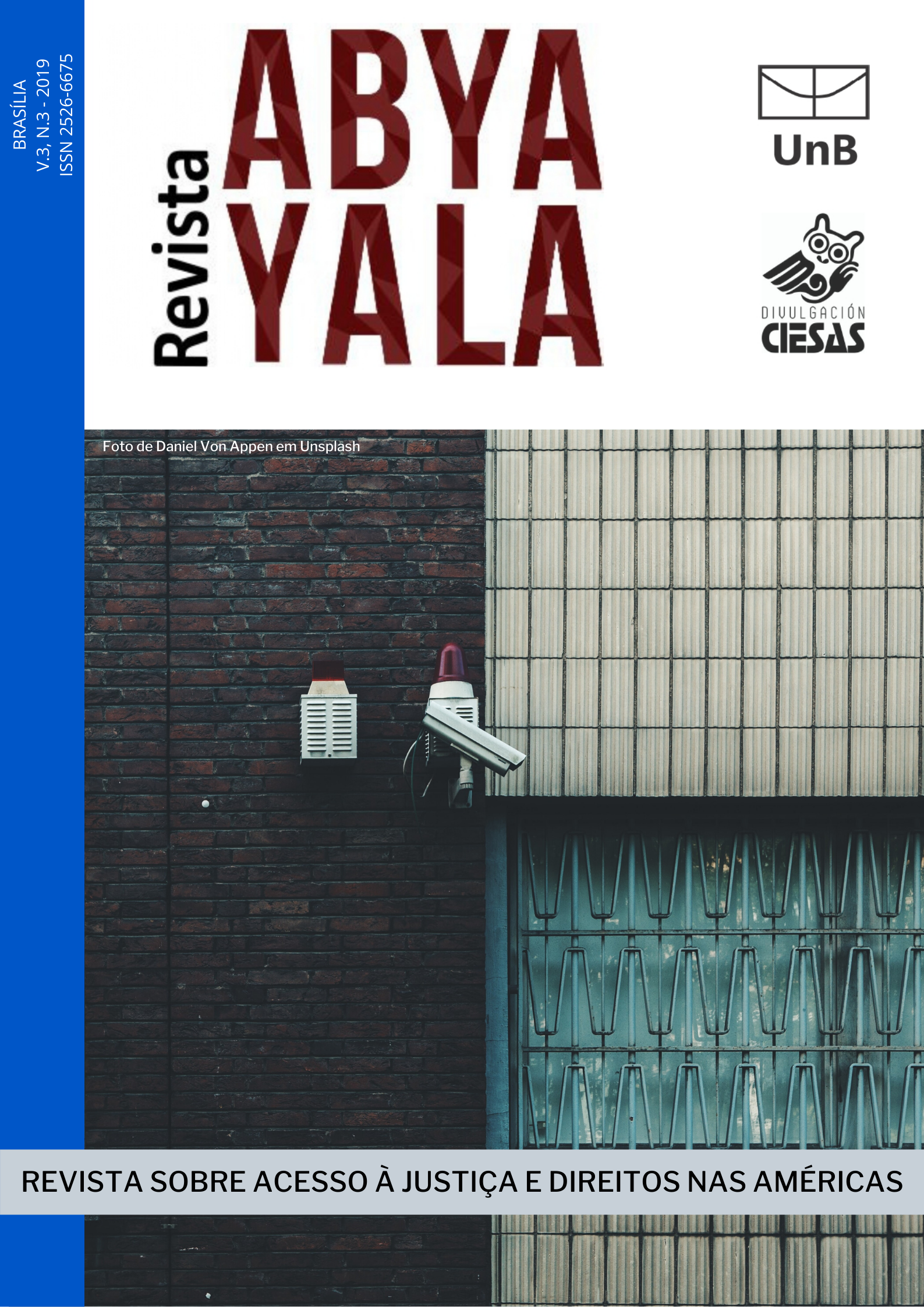TO THE REPUBLIC OF SIMÓN BOLÍVAR
A bastion against the 'tyranny' of the majority
DOI:
https://doi.org/10.26512/abyayala.v3i3.30193Keywords:
Simón BoliÌvar, independence, citizenship, race relationsAbstract
Based on Bolívar’s speeches, decrees, and correspondence as well as on Gran Colombia’s constitutions and laws, this essay examines the tensions within Bolívar’s vision of Venezuela’s and New Granada’s society produced by his republican, yet authoritarian and hierarchical ideas, his concern for keeping the lower classes of African descent in check, and his denial of Indian agency. It shows that even in Peru, Bolívar’s main concern was to prevent the racial war and social disintegration that allegedly slaves and free Afro- descended people would bring to the newly independent nations. To prevent such an outcome, he advocated all along legal equality through the abolition of the colonial privileges and, since mid-1816, the abolition of slavery, but simultaneously the preservation of the monopole of power by the white creole elite. He secured the perpetuation of the socioracial hierarchy inherited from Spain by a two-edged citizenship: an active citizenship restricted to a tiny literate and skilled minority and an inactive citizenship for the immense majority of (mostly nonwhite) men.
Downloads
References
BARRERAS, Antonio (ed.). Textos de las constituciones de Cuba (1812-1940). La Habana: Minerva, 1940.
BLANCHARD, Peter. Under the Flags of Freedom: Slave Soldiers and the Wars of Independence in Spanish South America. Pittsburgh: University of Pittsburgh, 2008.
BIERCK JR., Harold A. "The Struggle for Abolition in Gran Colombia". Hispanic American Historical Review, Durham, v. 33, n. 3, p. 365-386, Aug, 1953.
BOLÍVAR, Simón. Obras completas. 2 v. La Habana: Lex, 1947.
_____. Decretos del Libertador. T. 1. Caracas: Imprenta Nacional, 1961.
BUSHNELL, David. "The Last Dictatorship: Betrayal or Consummation?". Hispanic American Historical Review, Durham, v. 63, n. 1, p. 65-105, Feb, 1983.
_____. Simón Bolívar: Liberation and Disappointment. New York: Longman, 2004.
COLLIER, Simon. "Nationality, Nationalism, and Supranationalism in the Writings of Simón Bolívar". Hispanic American Historical Review, Durham, v. 63, n. 1, p. 37-64, Feb, 1983.
_____. Simón Bolívar as a Political Thinker. In: David Bushnell & Lester D. Langley (eds.). Simón Bolívar: Essays on the Life and Legacy of the Liberator. Lanham: Rowman & Littlefield, 2008.
DUCOUDRAY, Henry L. V. Memoirs of Simon Bolivar, President Liberator of the Republic of Colombia. Boston: Goodrich, 1829.
FAVRE, Henry. "Bolívar et les Indiens". In: L. Tacou (ed.). Simón Bolívar. Paris: L’Herne, 1986.
GEGGUS, David P. Haitian Revolutionary Studies. Bloomington: Indiana University, 2002.
HELG, Aline. Our Rightful Share: The Afro-Cuban Struggle for Equality, 1886-1912. Chapel Hill: University of North Carolina, 1995.
_____. "Simón Bolívar and the Fear of Pardocracia: José Padilla in Post-Independence Cartagena". Journal of Latin American Studies, Cambridge (UK), v. 35, n. 3, p. 447-471, Aug, 2003.
_____. Liberty and Equality in Caribbean Colombia, 1770-1835. Chapel Hill: University of North Carolina, 2004.
LASSO, Marixa. Myths of Harmony: Race and Republicanism during the Age of Revolution, Colombia, 1795-1831. Pittsburgh: University of Pittsburgh, 2007.
LYNCH, John. "Bolívar and the Caudillos". Hispanic American Historical Review, Durham, v. 63, n. 1, p. 3-35, Feb, 1983.
_____. Simón Bolívar: A Life. New Haven: Yale University, 2006.
MADARIAGA, Salvador de. Bolívar. London: Hollis & Carter, 1952.
MELISH, Joanne Pope. Disowning Slavery: Gradual Emancipation and “Race” in New England, 1780-1860. Ithaca: Cornell University, 1998.
NASH, Gary B. & SODERLUND, Jean R. Freedom by Degrees: Emancipation in Pennsylvania and Its Aftermath. New York: Oxford University, 1991.
O’LEARY, Simón D. (ed.). Memorias del General O’Leary, publicadas por su hijo, Simón D. O’Leary. T. 12. Caracas: Gaceta Oficial, 1880.
PADILLA, José. "Al respetable público de Cartagena". In: Archivo Histórico Nacional de Colombia, Bogotá, SecciónRepública,Archivo Restrepo, fondo 12, caja 88, v. 170, p. 125- 126, 1824.
RESTREPO, José Manuel. Diario político y militar: Memorias sobre los sucesos importantes de la época para servir a la historia de la revolución de Colombia y de la Nueva Granada desde 1819 para adelante. T. 1. Bogotá: Imprenta Nacional, 1954.
TACOU, Laurence (ed.). Simón Bolívar. Paris: L’Herne, 1986.
THIBAUD, Clément. Repúblicas en armas: Los ejércitos bolivarianos en la guerra de independencia en Colombia y Venezuela. Bogotá: Planeta, 2003.
TORRES, Jesus Clodoaldo. El Almirante José Padilla (epopeya y martirio). 2a ed. Bogotá: Imprenta y Litografía de las Fuerzas Militares, 1990.
URIBE, Diego (ed.). Las Constituciones de Colombia. T. 2. Madrid: Cultura Hispánica, 1977.
VALENCIA, Alonso. Marginados y “sepultados en los montes”. Orígenes de la insurgencia social en el valle del río Cauca, 1810-1830. Cali:Universidad del Valle, 2008.
YACOU, Alain. (ed.). Bolívar et les peuples de Nuestra América: des sans-culotte noirs au libertador. Bordeaux: Presses Universitaires de Bordeaux, 1990.
ZULUAGA R., Francisco U. Guerrilla y sociedad en el Patía: Una relación entre clientelismo político y la insurgencia social. Cali: Universidad del Valle, 1993.
Outras fontes
CONGRESO DE CÚCUTA. Libro de Actas. 3a ed. Bogotá: Banco de la República, 1971.
REPÚBLICA DE COLOMBIA. Memoria que el secretario de estado y del despacho del interior presentó al congreso de Colombia. Bogotá: Espinosa, 1823.
_____. Codificación nacional de todas las leyes de Colombia desde el año de 1821, hecha conforme a la ley 13 de 1912. T. 1. Bogotá: Imprenta Nacional, 1924.
Downloads
Published
How to Cite
Issue
Section
License
Copyright (c) 2019 Abya-Yala: Journal on Access to Justice and Rights in the Americas

This work is licensed under a Creative Commons Attribution-NonCommercial 4.0 International License.
The sending of contributions to Abya Yala implies the assignment of copyright and publication to the Journal, observing the Attribution-Non-Commercial 4.0 International (CC BY-NC 4.0) adopted.
The content of the texts submitted to and published by the journal will be the sole responsibility of their respective authors.
Copyright: https://creativecommons.org/licenses/by-nc/4.0/deed.en








